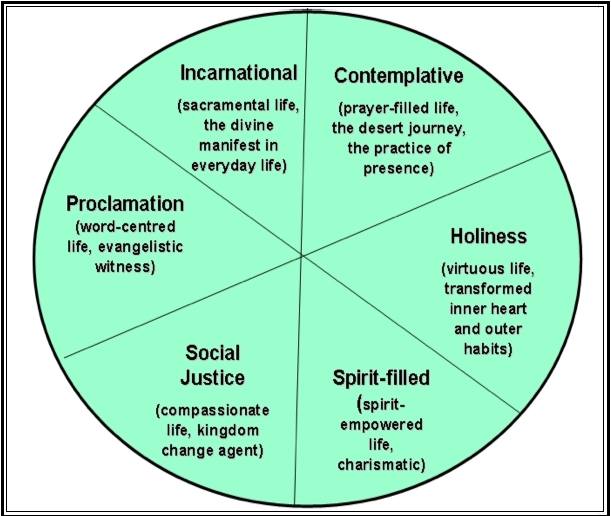Six Spiritual Traditions
A healthy Christian spirituality remains in constant dialogue with its own traditions. As you deepen your own spiritual life and enrich it with various spiritual practices, it might become important for you to situate yourself within the vast and rich history of our faith.
Few of us, it seems, have a clear sense of the giants of the faith on whose shoulders we stand. Often, we know very little about how our faith has been lived out throughout the centuries. While times change and the world is certainly different than it was for our forebears, most of their insights into the spiritual journey remain useful for us today, with some reinterpretation. There is a growing number of books describing the ancient practices as well as the church’s return to them. In fact, it has been found that the vital congregations in mainstream churches around the world are those which have rediscovered these ancient practices.
Among the best resources are:
a. Dorothy C. Bass (ed.) Practicing our Faith (ISBN 0-7879-3883-1),
b. Diana Butler Bass Christianity for the Rest of Us. (ISBN 978-0-06-085949-7), and
c. Brian McLaren Finding our Way Again. The Return of the Ancient Practices (ISBN 978-0-8499-0114-0).
The classic exposition remains, however, Richard Foster Streams of Living Water. Celebrating the Great Traditions of Christian Faith (ISBN 0-06-066743-5), along with his companion volume of excerpts from many of the spiritual classics he refers to in his text, Devotional Classics, (ISBN 0-06-077750-8). (For more on Foster’s work, visit his website.)
Foster identifies six major traditions, all emanating from Jesus’ life and teaching. Each speaks to a particular aspect of Christian life. Foster names these six traditions the Contemplative, the Holiness, the Charismatic, the Social Justice, the Evangelical (Proclamational) and the Incarnational. You can see right away that all six form an integral approach to Christianity. Yet we all know we have preferences, and our predecessors had preferences. This explains in part the rich variety of Christian denominations – each emphasizes one aspect of Christian life over another. It also explains the many aberrations and distortions in the understanding of our faith, as we tend to emphasize one tradition over the others. A healthy Christian spirituality requires an integrated balance of all six traditions.
To really appreciate this, you can read Brian McLaren’s A Generous Orthodoxy, in which he celebrates the diversity of Christian expressions. While we may have a preference for one or the other, a rounded Christian life takes all into account. There is no substitute for actually reading Foster’s text. The following screens will simply provide a brief overview to whet your appetite for more…
Here is a way to look at this: out of the full life and message of Jesus have come these six partial interpretations of what it means to be Christian…
We can characterize each as follows:
Let us now look at each tradition in turn. Foster offers a list of key figures representing each tradition through the centuries, focusses on a contemporary example, then provides the characteristics, strengths as well as the weaknesses of each tradition, and suggests ways of complementing one with the others. The following is but a brief summary of his rich material.
The contemplative tradition – the prayer-filled life
The holiness tradition – the virtuous life
The charismatic tradition – the spirit-empowered life
The social justice tradition – the compassionate life
The evangelical tradition – the word-centred life
The incarnational tradition – the sacramental life

